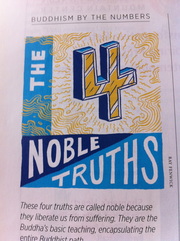 From March Shambala Sun. Ray Fenwick. Photo A.Rittger
From March Shambala Sun. Ray Fenwick. Photo A.Rittger It seemed like quite a few in the class of more than 100 learners were new to the subject matter. I was not, and at first I thought this was okay. I expected to battle through my end-of-the day weariness and not to mind if the dharma talk I anticipated got dumbed down. But I was wrong. If this had been my first class on the 4 big truths, I'm sure I would have appreciated Mushim’s friendly, easy-on-the-understanding teaching more than I actually did. During this first class, I was amused sometimes; but not like the real new learners, who laughed aloud at “dukkha”: the Pali word for suffering. Without realizing it, I had overestimated my equanimity and underestimated my capacity for dukkha.
I registered for the class because I have a three-block walk to EBMC, and in the past I had liked Mushim’s dharma talks. Moreover, I love the idea of EBMC – its diversity and generosity-based pay plan that excludes no one for lack of money.
That evening, because I have been taught to look at every aspect of my life as “the Path,” I took an interest in my restlessness: the shifts, twitches and yawns. I was aware that the room was dark, and air purifiers hummed in the background. As Mushim talked, I recited silently a three-part Pali chant I had learned in another EBMC workshop in December. I noticed how as the words became foreground I could hear her and the other students at the back of my attention. This way, being judgmental was almost impossible as I didn't have enough left-over mental activity for judgments.
Despite my disappointment and general twitchiness, I did learn a few things. By tuning out because I thought I knew it all, I disregarded a lot I didn't know. I didn’t know Mushim had prepared a power-point presentation for this class; and Mahogany, the event manager, told her the class was too large for her to show it as everyone would have had to shift around. Surely that disappointment meant dukkha for Mushim and maybe for Mahogany too. And I learned Mushim's cat had died.
Walking home from that first class meeting, I remembered Mushim saying how the Buddha tells us to turn to our own experience. Ehipassiko which is Sanskrit and means "Come and see for yourself." So here is what I came to see for myself after that class: There is more than one thing and its opposite. So don't construct too narrow a category of what I think I need to learn. Leave room for the universe.
 RSS Feed
RSS Feed